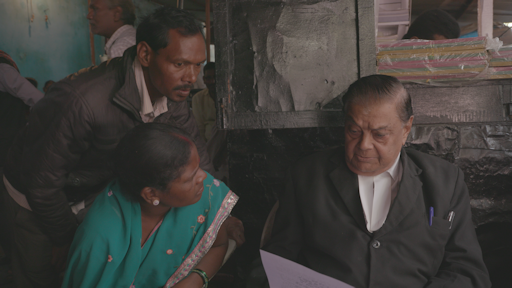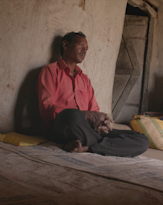This is a violent story filmed within a gentle, moving, inspiring, gorgeous ambiance with lilting sitar, tabla and flute music whispering throughout as if this was a love story. And indeed it is. It shows the stand-out courage, commitment and love of a father who supports his daughter’s honor, at her request, even if his life must be sacrificed.
The film begins with a calm, pastoral morning. A girl is walking a goat on a leash carrying a bowl of produce on her shoulder. Life is unhurried and a verdant lush surrounds the tall rice fields. There is humming. The family home is made of rammed earth walls. Roosters crow at dawn and a daughter braids her hair for school.
A news report comes on: “The rate at which reports of violence against women keep coming in. It’s time we ask, is something fundamentally wrong with our country?”
Then the focus story of the film unfolds. There is a wedding celebration, the violent event occurs, the girl tells her parents, they report to the police and get the medical tests. The gang rape and subsequent beating were so violent that they caused internal injury. When the boys left her they warned that they would kill her if she told anyone. Her family cared for her like they did when she was an infant. But she was strong enough to insist on prosecution.
Ranjit, the girl’s father, honored his daughter’s wish. In a country where approximately 90 percent of rapes go unreported and only 30 percent end in conviction, his decision was a new step, especially in his village, for justice.
The police tracked the boys down and took them to the station. Her father also reported to the Ward Member, the Mukhiya (head of the village). He sided with the boys and told Ranjit he should leave the police out of it. This is a village matter. The best thing to be done would be to immediately arrange a marriage for his daughter to one of the perpetrators. Ranjit refused.
“To Kill a Tiger” shows how the village with its traditional patriarchal culture rose up against prosecution and threatened Ranjit’s family. Especially unnerving for the villagers was the involvement of the Srijan Foundation, an advocacy organization, that began filming early on. They knew their reactions, their lack of support, their own hypocrisies were on camera. Perhaps this kept the family safer.
We know that rape and violence towards women is not just an issue in India. It is a world issue that has occurred through time in all societies and social strata. Whether in war or peace, women and girls are vulnerable. Nisha Pahuja’s delicate but powerful film brings it back to men, showing what a father can do with support from an activist group. His daughter gratefully and strongly says, “Those who steps walk in unison never fail.”

Credits
Director/Writer: Nisha Pahuja
Producers: David Oppenheim, Nisha Pahuja, Cornelia Principe, and Andy Cohen
Cinematography: Mrinal Desai
Editors: Dave Kazala and Mike Munn
Music: Jonathan Goldsmith
Genre: Documentary
Production Companies: National Film Board of Canada, Notice Pictures and AC Films, Inc.
Release: Jan. 9, 2023 (US)
Official website, trailer and how to watch: https://tokillatigerfilm.com
. . .
Join us on Facebook at
http://www.facebook.com/itsjustmovies!
